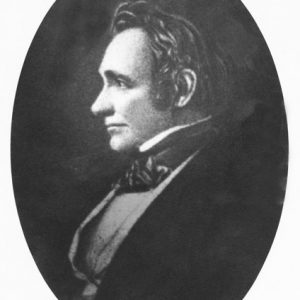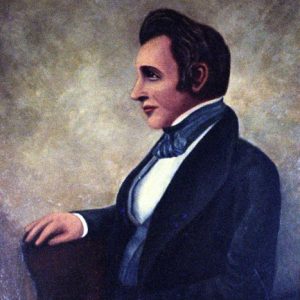calsfoundation@cals.org
William Savin Fulton (1795–1844)
William Savin Fulton was appointed Arkansas’s last territorial governor by President Andrew Jackson in 1835 and served as Arkansas’s first junior senator after statehood in 1836 until his death on August 15, 1844. He is most often associated with the Democratic Party, and when serving as governor, he surrounded himself with controversy by opposing immediate statehood for Arkansas.
William Fulton was born in Cecil County, Maryland, on June 2, 1795. His parents were Irish-born David and Maryland native Elizabeth Fulton. Owing to his mother’s wealth, Fulton was provided with a formal education under Reverend Samuel Knox in 1803, and he attended Baltimore College in 1813 before practicing law in 1817.
Between his education and law career, Fulton served as a corporal in the Baltimore Fencibles, an elite volunteer unit, alongside his father in the days leading up to the fourteen-hour naval bombardment at Fort McHenry during the War of 1812. In 1815, Fulton traveled to Florida to serve as private secretary to a family friend, General Andrew Jackson, in the Seminole Wars. After his service with Jackson, Fulton moved to Tennessee in 1820 and then to Florence, Alabama, where he engaged in law and wrote editorials for the Democratic newspaper, the Florence Gazette. He was elected judge of Lauderdale County, Alabama, in the 1820s and was joined there by his extended family, which had moved from Maryland to take advantage of the new financial opportunities in the west.
Fulton married his first cousin, Matilda Frances Nowland, in 1823; the next year, she gave birth to a daughter, Elizabeth Rebecca. The couple soon had two more children, David Peregrine in 1826 and Mary Jane in 1829.
In 1829, Fulton was appointed by President Andrew Jackson as the secretary to the territory of Arkansas, replacing the Whig candidate, Robert Crittenden. Fulton and his family arrived in Arkansas in the summer of 1829, and he immediately took over the job as acting governor in the absence of Governor John Pope. During Pope’s frequent absences from Arkansas, Fulton often acted as governor or traveled between Washington DC and Little Rock (Pulaski County) on territorial business.
Thanks to his backing by the powerful Democratic faction in territorial Arkansas, Fulton was able to bestow political positions upon family members. His brother John became secretary to Governor Pope, and his father became postmaster of Little Rock. Fulton also secured his brother-in-law a position as sutler, or merchant, at Fort Gibson in Indian Territory. Fulton was also able to purchase property in Little Rock that included several lots, which he called Rosewood, the present-day site of the Arkansas governor’s mansion. His prominent status also allowed him to send his eldest daughter, Elizabeth, to a female seminary in Georgetown during the 1830s. Fulton’s family also grew as the couple had more children: Hickory, Sophia, Mary Jane, Matilda Frances, Maria Eller, and Ida. Only Elizabeth, Sophia, and Ida survived to adulthood.
Jackson appointed Fulton governor on March 9, 1835. He is known for his actions during the debate whether to enter Arkansas as the twenty-fifth state in the Union. Fulton was generally opposed to statehood on the grounds that neither the people nor the resources were ready. As a result, he received a great deal of criticism from politicians, newspapers, and the public. Despite this, the state legislature elected Fulton to the U.S. Congress as the junior senator from Arkansas in 1836. In Washington DC, Fulton joined his friend, Senator Ambrose Sevier, where he spent most of his time until his death.
Fulton suffered a premature death in the late fall of 1844. According to family lore, he slept in a newly painted room on one of his visits to Rosewood and died mysteriously afterward. He was buried in Little Rock’s Mount Holly Cemetery in the Fulton-Nowland plot. His memory and his accomplishments were carried on by his ambitious eldest daughter, Elizabeth Wright, who spent most of her life trying to keep her father’s memory alive, rebutting issues related to the fight over statehood during her father’s administration.
For additional information:
Baker, Lea Flowers. “William Savin and Matilda Fulton: A Brief Look at a Territorial Arkansas Family.” Pulaski County Historical Review 48 (Winter 2000): 74–84.
Bolton, S. Charles. Remote and Restless: Arkansas, 1800–1860. Fayetteville: University of Arkansas Press, 1998.
———. Territorial Ambition: Land and Society in Arkansas, 1800–1840. Fayetteville: University of Arkansas Press, 1993.
William Savin Fulton Collection. Arkansas State Archives, Little Rock, Arkansas.
Lea Flowers Baker
Little Rock Central High School National Historic Site








Comments
No comments on this entry yet.